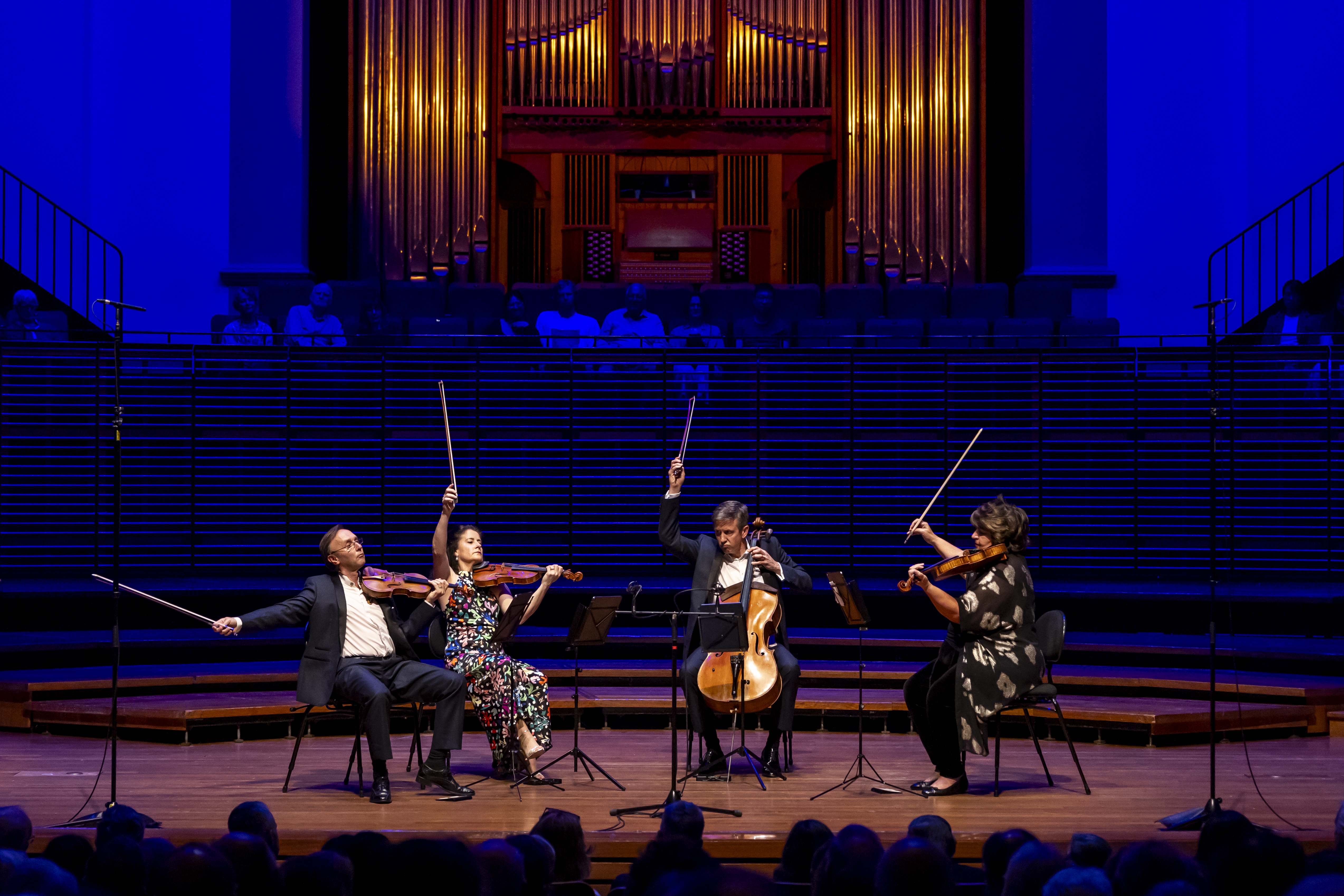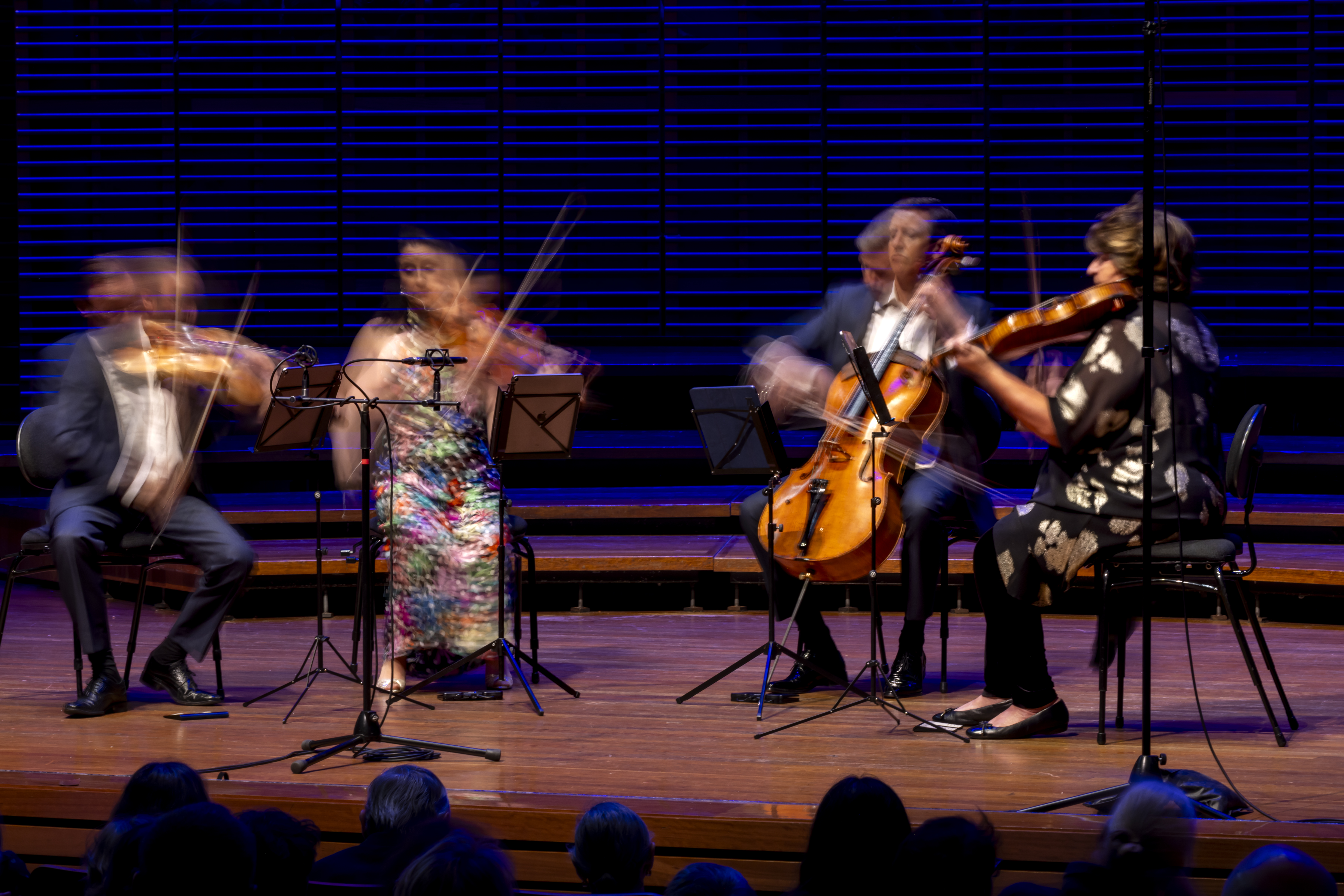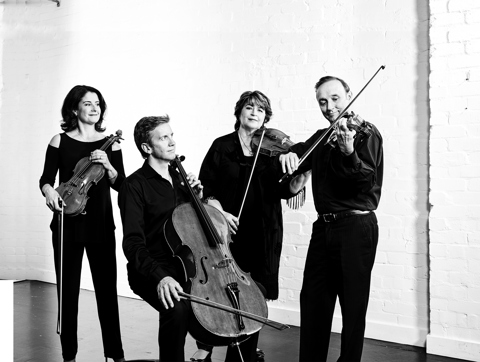Dene. Dimity. Irina. Julian. They hardly need an introduction. Anyone who follows chamber music in Australia will immediately know them as the four musicians who comprise the Goldner String Quartet.
Together, they have clocked up an extraordinary 30 years of giving concerts and making recordings, and without a single change of personnel. Few human groupings in any endeavour manage to go such a distance.
Rarer still is the close-knit rapport between these exceptional musicians, so evident in their music-making.
In a conversation ahead of their final concert this evening, married couples Dene Olding and Irina Morozova, and Julian Smiles and Dimity Hall, reflect on music, their audience and achievements – and why they have decided to call time on this remarkable ensemble.
It’s a nice closing of the circle that the Goldners’ final concert at Verbrugghen Hall is also the 79th anniversary of Musica Viva Australia’s first concert in 1945 - and that this special occasion marks the unofficial launch of MVA’s 80th anniversary season.

Goldner String Quartet Farewell Concert at Verbrugghen Hall. Credit: Katherine Griffiths
The Goldners’ origin story gives some insight into their longevity. All were members of the Australia Ensemble and previously had performed together as a quartet. Urged to form a more permanent group, they took their name from Musica Viva Australia’s founding father, Richard Goldner, and had their baptism of fire at the 1995 Domaine Chandon festival in the Yarra Valley, playing no fewer than 11 of Beethoven’s 16 quartets.
'The idea was to do all the Beethovens in the one weekend,' Smiles recalls. 'We said, “That’s not possible” – but we did do the middle and the late ones.'
'Because we were stupid,' says Morozova.
'Optimistic,' says Hall.
'We learned so much,' says Smiles. 'And by doing them so intensely at the beginning, they became part of our root system in the way that we approach music. It was bound to have an effect on our sound and our approach. If we’d started off doing Shostakovich, maybe we would be a different quartet now.'
Other factors influenced the quartet’s sound. Morozova had studied with Goldner and continues to play his viola – made for him by Sydney luthier AE Smith in 1947, and which she now owns.
'I still think of it as Richard’s viola, and I feel very close to him,' Morozova says. 'I had a chance to get a fine Italian instrument to match the others (in the quartet) – I tried it, it didn’t sound like me, and it was totally wrong.
'I think maybe the fact (the Smith viola) isn’t a perfect match makes a point of difference with our total sound. It’s a special instrument.'
The Goldners have performed the canonical works for string quartet – and, in partnership with Piers Lane, piano quintets – and have also been champions of music by Australian composers. Their recordings of quartets by Peter Sculthorpe and Carl Vine may be regarded as definitive, and they also recorded an acclaimed set of the Beethoven quartets.
After what must be hundreds of concerts, why have they decided to make their 30th season the last?

Goldner String Quartet Farewell Concert at Verbrugghen Hall. Credit: Katherine Griffiths
Morozova says it’s better to quit when you’re ahead, still at the top of your game. Olding, who in recent years has stepped down from his longstanding positions with the Sydney Symphony Orchestra and the Australia Ensemble, says the work of being in a quartet is so much more demanding than were his other musical jobs.
Smiles says he wants to move on to fresh musical adventures, beyond being a member of a quartet.
Covid lockdowns took their toll, too, says Hall. It was 'shattering' to have concerts cancelled in 2020, the Goldners’ 25th anniversary year, and all the more difficult to get back to form after the interruption.
All four recognise it’s the end of an era, for themselves and for their audience.
Over the years they have got to know people at concerts and festivals around the country. It occurs to Morozova that she may not see many of them again. 'It’s personal,' she says of that treasured relationship between musician and audience.
Their program this evening has such an air of valediction and celebration. The title of Matthew Hindson’s Nothing is Forever certainly catches the mood, and was chosen to represent the music of all the Australian composers the Goldners have performed over the years.
Schubert’s ‘Death and the Maiden’ fills out the program because the Goldners wanted to include a full-length work, and a popular one. Smiles says people never tire of hearing it, just like he never tires of reading The Lord of the Rings.
The middle part of the concert is from Beethoven’s String Quartet No. 15, and harks back to the Goldner String Quartet’s first performances in 1995. The single movement carries the inscription ‘Heiliger Dankgesang’, Holy song of thanksgiving.
'It will be an especially poignant moment, I think,' says Olding. 'You don’t know how you feel until you play it.'
'It has special meaning for us,' Hall says. 'We have played it for different occasions, happy and sad.
'We will try to give thanks, as the title implies.'
From us in the audience – thank you, Goldner String Quartet, for 30 years of wonderful music and memories.

